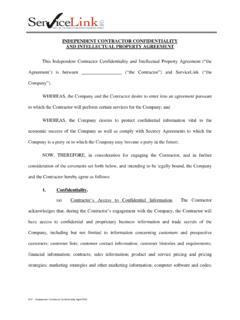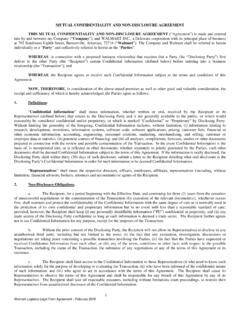Transcription of Late-Executed Assignments in PCT Applications Can Impact ...
1 McNeill Baur PLLC Late-Executed Assignments in PCT Applications Can Impact rights Across different jurisdictions BNA s World Intellectual Property Report September 1, 2011 REBECCA M. MCNEILL By Rebecca M. McNeill, Amanda K. Murphy, and Blair Rinne Some companies opt to postpone the execution of patent Assignments until after Applications are filed, so they can officially list the application number and filing date on the assignment . Other times, inventors and attorneys revising Applications until the last minute may not have time to execute an assignment before filing. In other cases still, parties are simply not as thorough about the information included on an assignment . These practices can have untoward effects, because executing Assignments after filing, especially after the filing of a Patent Cooperation Treaty (PCT) application, or not including all of the pertinent information can potentially jeopardize patent rights in some jurisdictions .
2 PCT Standards and National Law At first glance, the PCT s applicant standards seem straightforward. Section 212(a) of the Administrative Instructions specifies who is entitled to apply for and be granted a patent when the inventor is not the applicant, and how the declaration for this circumstance should be made under Rule The rules allow a non-inventor to be an applicant in a variety of ways, including by virtue of an assignment , an agreement, or as the employer of the inventor. Unfortunately, these PCT standards offer a false sense of security for applicants. The notes accompanying the PCT Request Form point out that a Rule declaration does not of itself establish the matters declared; the effect of those matters in the designated States concerned will be determined by the designated Offices in accordance with the applicable national law.
3 In other words, although an applicant s Rule declaration may state, for example, that the applicant can proceed as the employer of the inventor, individual countries may require additional proof in order to enter or succeed in the national stage. Furthermore, Rule (c) reiterates that the effect of the international application in any country depends on whether the applicant is qualified to file a national application under that country s law. Therefore, applicants cannot seek safe harbor by simply satisfying the PCT rules. 2 McNeill Baur PLLC European Example For example, in one case, an assignment referred to a European application, but did not specifically reference the US priority application. This practice was found to violate requirements in some European countries but not others.
4 The assignment was executed in Switzerland, where priority rights can be assigned without any particular formal requirements and a mutual oral agreement is sufficient. France, however, has a much stricter standard. In Magiq Technologies v. Swisscom, France s Tribunal de Grand Instance denied the applicants their right to priority because the assignment by Swiss inventors, although sufficient in Switzerland, did not include an express statement that all of the priority rights were transferred (see Tribunal de grande instance [TGI] [ordinary court of original jurisdiction] Paris, 3e ch, 2e sect, January 30, 2009, PIBD 2009, 899, note J Raynard (Fr)). As a result, the court held the patent invalid over a novelty-destroying intervening scientific publication of the inventors.
5 Irrespective of whether this rationale is followed in other countries, or even whether other French courts follow this lower court ruling, this decision emphasizes the importance of taking into account individual country s requirements governing the sufficiency of Assignments within their borders and approaching the assignment with attention to detail, including proper assignment of both the cases-at-hand and any priority Applications . Treatment in the United Kingdom Beyond the content of an assignment , some situations require that applicants complete Assignments prior to filing. In 2009, the UK Patents Court issued a decision explaining British law on the subject. In Edwards Lifesciences AG v. Cook Biotech Inc [2009] EWHC 1304 (Pat), the PCT application had a filing date of January 31, 2001, and it claimed priority from a US patent application filed on January 31, 2000.
6 The PCT application listed Cook Biotech ( Cook ) as the applicant, while the US application listed the three inventors as applicants, only one of whom worked for Cook. The other two inventors assigned their interests to Cook, but not until September 2002, which was 21 months after Cook had filed the PCT application. Cook argued it still had a good claim to priority because it had acquired all rights in the invention before the patent was granted. The court ruled a person is only afforded the privilege of priority if he is the successor in title to the person who filed the earlier application and that this cannot be satisfied by subsequently acquiring title to the invention. The resulting loss of priority allowed for the admission of an intervening item of prior art, which was used to invalidate Cook s patent.
7 Clearly, under UK law, applicants must determine ownership of the original invention and the entitlement to priority based on an earlier filing before the date of the later filing, or risk jeopardizing their earlier priority claim. Despite a heavy burden under UK law with respect to timing, UK courts seem to have more relaxed standards with respect to what qualifies as an assignment . The following year, in KCI v. Smith & 3 McNeill Baur PLLC Nephew [2010] EWHC 1487 (Pat), the Patents Court reaffirmed Cook regarding the timing for claiming priority, but also relaxed the standards for what was sufficient to establish ownership. In KCI, the patent was filed in the name of the inventor, but KCI contended it was the successor in title by means of a confidentiality agreement the inventor had signed.
8 The confidentiality statement included the clause: I hereby assign and agree to assign to the Company all right, title and interest in all confidential information, inventions and improvements conceived or developed by me, alone or in conjunction with others, during my employment. The court held this clause was sufficient to assign legal title to KCI, therefore establishing that KCI was the legal successor in title at the time of filing of the PCT application. This judgment suggests it is not difficult to achieve an enforceable assignment in the UK, provided it is promptly filed. Treatment in New Zealand New Zealand law appears to have much stricter standards for what qualifies as an assignment . Under the New Zealand Patents Act 1953, a patent can be revoked if it was applied for in the name of a person that was not entitled to make that application.
9 The right to apply in New Zealand is determined at the time of the PCT filing (if entry into New Zealand proceeds through a national phase application). In New Zealand, an inventor cannot assign legal title conveying a right to apply before the intellectual property right was created, so an employment agreement will not effectively assign legal title in an employee s invention if the agreement predates the invention. There are also differences of opinion among New Zealand attorneys regarding filing requirements. Although they agree that if an assignment has been executed prior to filing, that documentation will suffice, attorney commentaries disagree on the outcome if the assignment has not been completed. Some say entry into the national phase in New Zealand requires an original or certified copy of the assignment document, while others say the national phase may be entered in the name of the inventors and the assignment can then be recorded at the NZ Intellectual Property Office (IPONZ) to update the chain of title.
10 Although Cook is not binding, its approach is likely to be influential on New Zealand courts. Prior to that case, IPONZ had allowed applicants to correct the chain of title to comply with New Zealand requirements if an improper applicant was listed. Since the Cook decision, however, IPONZ has objected to some such Applications based on the priority issue and right to apply issue. However, changes to the New Zealand system may be on the horizon. The Patents Bill currently before the country s parliament will supersede the current Act and will focus on a party s right to be granted a patent, rather than its right to apply. Some commentators suggest this will remove the 4 McNeill Baur PLLC right to apply issue. With so much uncertainty in the New Zealand requirements, executing an assignment prior to filing the PCT application would certainly be an applicant s safest option.





